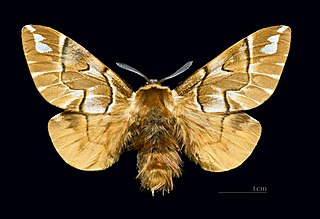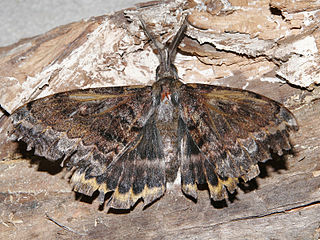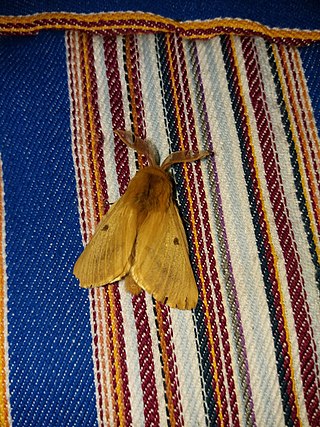
Bombycoidea is a superfamily of moths, including the silk moths, giant silk moths, sphinx moths, saturniids, and relatives. The superfamily Lasiocampoidea is a close relative and was historically sometimes merged in this group. After many years of debate and shifting taxonomies, the most recent classifications treat the superfamily as containing 10 constituent families.

Endromidae is a family of moths consisting of 16 genera with 72 species. This relictual family is related to the families Carthaeidae, Anthelidae, and Phiditiidae as part of the bombycine group “CAPOPEM”.

Anthelidae is a family of Australian lappet moths in the order Lepidoptera. It had earlier been considered to be part of the Lasiocampoidea superfamily, but a 2008 molecular phylogenetic study, supported by a 2011 study, resulted in reincluding the Anthelidae in the superfamily Bombycoidea.

Brahmaeidae is a family of insects in the order Lepidoptera, commonly known as Brahmin moths. It includes species formerly included in the family Lemoniidae.

Apatelodidae, the American silkworm moths, is a family of insects in the order Lepidoptera. They are a family within the superfamily Bombycoidea, though they have in the past been considered a subfamily of Bombycidae.

Lemonia dumi is a species of moth of the family Brahmaeidae. It is found in scattered populations in Central Europe.

Lemonia taraxaci, the autumn silkworm moth, is a species of moth of the family Brahmaeidae. It was first described by Michael Denis and Ignaz Schiffermüller in 1775 and it is found in south-eastern Europe.

Lemonia vallantini is a species of moth of the family Brahmaeidae. It is found in Morocco, Algeria and Tunisia.

Quentalia is a genus of moths of the family Bombycidae first described by William Schaus in 1929. It has at times been placed in the family Apatelodidae, but recent research indicates the subfamily Epiinae, to which Quentalia belongs, is affiliated with Bombycidae.
Sabalia is a genus of moths in the family Brahmaeidae.
Lemonia beirutica is a species of moth of the family Brahmaeidae. It was described by Franz Daniel in 1965. The range includes Israel and Lebanon.
Cheneya is a small genus of moths of the family Bombycidae, within which it is placed in subfamily Epiinae.
Colla similis is a moth in the Bombycidae family. It was described by Felder in 1868. It is found in the Neotropical realm.

Lemonia peilei is a moth in the family Brahmaeidae. It was described by Walter Rothschild in 1921.
Lemonia ponticus is a moth in the family Brahmaeidae. It was described by Per Olof Christopher Aurivillius in 1894.
Sabalia fulleborni is a moth in the family Brahmaeidae. It was described by Ferdinand Karsch in 1900.
Sabalia fulvicincta is a moth in the family Brahmaeidae. It was described by George Hampson in 1901.
Sabalia jacksoni is a moth in the family Brahmaeidae. It was described by Emily Mary Bowdler Sharpe in 1890.
Sabalia thalia is a moth in the family Brahmaeidae. It was described by James Farish Malcolm Fawcett in 1915.
Sabalia tippelskirchi is a moth in the family Brahmaeidae. It was described by Ferdinand Karsch in 1898.










